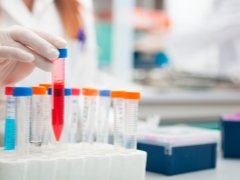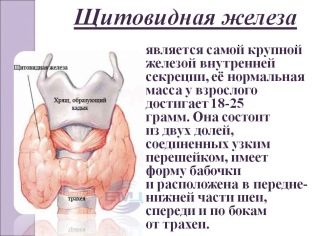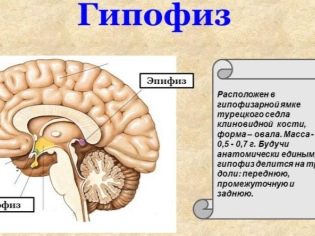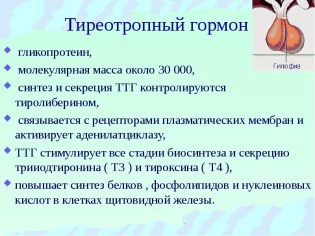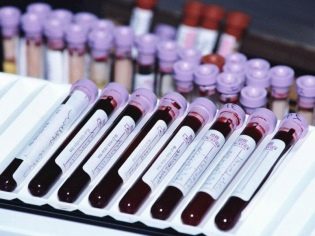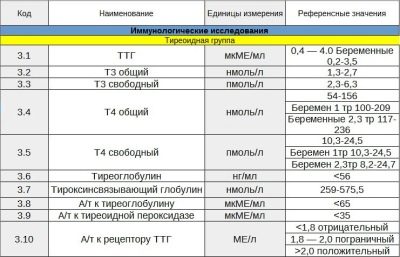What to do with low TSH during pregnancy?
Maintaining an optimal level of thyroid hormones during pregnancy is very important. This is necessary so that the baby fully grows and develops in the womb. Low levels of TSH during pregnancy is a dangerous condition that requires a mandatory correction.
What it is?
There is a rather strong interaction between the thyroid gland and the pituitary gland. Both of these organs emit hormones into the bloodstream, which are necessary for the implementation of many reactions and vital processes in the body.
The pituitary gland is a structure of the brain. It throws into the systemic circulation a hormone called thyrotropic. Its appearance in the blood leads to the fact that the thyroid gland begins to produce its own hormonal substances.
A low level of TSH in the blood contributes to the fact that Various pathologies begin to appear in the body of the future mom and her developing child.
Maintaining a balance between thyroid and thyroid-stimulating hormones is very important when planning a pregnancy. This situation is necessary for the conception to occur successfully, and the intrauterine development of the baby begins.
TSH does not directly have a significant effect on the female body. Affect the processes occurring in it thyroid hormones T3 and T4. They have an impact on the cardiovascular, nervous system, as well as on the functioning of the gastrointestinal tract.
A decrease in TSH contributes to an increase in thyroid hormones in the blood, which leads to the fact that In future mothers, certain adverse clinical manifestations begin to occur.
Symptoms
The severity of the clinical signs of reduced TSH in the blood is different. In many ways, it depends on how high the thyroid hormones T3 and T4 have become. With their significant increase in the future mother and begin to show adverse symptoms that significantly impair the quality of her life.
This situation leads to the fact that a woman begins to lose weight. In some cases, her body weight remains normal, but doctors do not notice any significant increases in terms of gestational age.
Woman begins to lose weight on the background of increased appetite. Some mommies say that in this state they experience a wolf hunger and begin to consume a huge amount of food. At the same time it is quite difficult for them to get enough.
A woman has a lot of sweating. And she, as a rule, complains about the appearance of a large amount of sweat on almost all parts of her body. Such a systemic hyperhidrosis worries the expectant mother both in the daytime and at night.
Increase in blood T3 and T4 contributes to violations in the cardiovascular system. This is usually manifested by changes and malfunction of the heart rhythm.
Frequent manifestation of such a situation is the development of arrhythmia. In this case, the woman may feel "interruptions" in the work of the heart or a confused heart rhythm. Especially unfavorable, if against the background of this situation, the expectant mother appears pronounced dizziness.
Blood pressure jumps are another possible symptom that occurs with a decrease in TSH in the blood. Often a woman complains of a persistent increase in blood pressure.In this case, as a rule, “upper” or systolic blood pressure rises. With an unfavorable course of pathology, his numbers can even reach 160-180 mm. Hg Art. and higher.
The increasing concentration of thyroid hormones in the blood leads to neurological disorders. This is usually manifested by the appearance of a strong pathological tremor (tremor) of the hands.
This symptom leads to the fact that it is difficult for a woman to insert a thread into a needle or even write with a pen on paper.
Some future mothers who have a reduced concentration of TSH in their blood complain to their doctors that they have a constant feeling of "heat." This leads to the fact that a woman chooses the wrong clothes for walking on the street and gets cold. The development of colds also contributes to severe sweating.
Behavior change is one of the most characteristic symptoms that arise in this pathology. It is manifested by the fact that the future mommy has a strong anxiety, nervousness.
Many women who have these disorders increase their aggressiveness. They can “flare up” over trifles, often quarrel with their husband and close relatives, they can “break off” against children.
Excessive activity and the desire for vigorous activity is also a characteristic feature of this pathology. Despite her position, a woman tries to lead a very active lifestyle, constantly in motion. Her day is literally painted by the minute. Against the background of such activity, she does not feel any fatigue.
The increase in blood T3 and T4 contributes to the fact that the woman starts talking faster. Quite often, this is manifested in the fact that it begins to “speak up” and even confuse words. It is important to note that the future mother does not notice these violations in her behavior.
If her relatives tell her about this, then the reaction to criticism is extremely aggressive.
Norms
The concentration of thyroid hormone in the blood varies throughout pregnancy. This is due to the fact that the hormones of the future mom undergoes constant changes. The jumps in the concentration of hCG, prolactin and other specific pregnancy hormones in her blood lead to the fact that the level of TSH changes.
In the very first days since the conception of a baby, the concentration of the thyroid-stimulating hormone in his mother’s blood is very low. Then it starts to increase gradually. In the first half of pregnancy, the average concentration in the blood of this hormone is usually from 0.1 to 3 mIU / ml. In the future, the level of TSH only grows. In the second half of pregnancy, its normal values are 0.2 to 4 mIU / ml.
It is important to note that the reference boundaries of this indicator may differ slightly in different laboratories.
It depends on the equipment on which the tests are performed, as well as on which units of measurement a particular medical institution uses. To pass such a laboratory test can be in the direction of the endocrinologist of female consultation or independently.
Consequences for the fetus
If the blood of the expectant mother significantly and a long time reduced TSH, this can lead to quite dangerous complications for her child. Quite often, this situation leads to the fact that the baby disrupts the natural processes of intrauterine development. This pathology is also dangerous due to the development of undesirable anomalies and defects that can form in the fetus at different periods of its growth.
The most critical situation is spontaneous miscarriage. It usually develops in the very early stages of pregnancy. This situation is accompanied, as a rule, by the development of severe bleeding and the appearance of a pronounced pain syndrome in the abdomen of the expectant mother. In this case, emergency hospitalization of the woman to the hospital is required for intensive treatment.
A persistent decrease in TSH in the blood during late pregnancy can contribute to the formation of various pathologies of the placenta.This leads to impaired blood flow through the uteroplacental blood flow system, which is dangerous for the fetus to develop persistent and severe hypoxia.
Treatment
Detection of a decrease in thyroid hormone in the blood is a mandatory pretext for referring the expectant mother to an endocrinologist's consultation. This doctor will palpate the thyroid gland, as well as a full clinical examination.
If necessary, a specialist can appoint additional tests, as well as an ultrasound examination of the thyroid gland. These tests are necessary to establish the correct diagnosis.
Significant decrease in TSH in the blood of the future mother - the indication for her appointment antithyroid drugs. These drugs reduce the level of T3 and T4, helping to reduce the resulting adverse symptoms in a woman.
Selection of these drugs is carried out strictly individually. For this purpose, the initial condition of the woman, her weight, the nature of the course of pregnancy, as well as the potential risk such drugs may have on the fetus are assessed.
To eliminate the undesirable symptoms of the cardiovascular system, the expectant mother is prescribed medications aimed at correcting the resulting irregularities.
You can eliminate arrhythmia with beta blockers. Use such drugs should be on demand.
Constantly use them only with the permission of the cardiologist.
Monitoring of prescribed therapy is carried out using regular ECG. Such studies help physicians assess how much the heart rhythm has changed and whether any irregularities remain during the use of medicines.
Conservative therapy with the use of drugs - A basic measure that is used in pregnant women. With its ineffectiveness usually requires surgical treatment. However, during pregnancy, doctors try not to resort to this method of therapy.
These operations are performed only under general anesthesia. All drugs are extremely toxic to the fetus. Surgical treatment of thyroid abnormalities is carried out only under strict medical indications and with the threat to the life of a pregnant woman.
The endocrinologist monitors the patient's condition during pregnancy. It is this specialist, not the obstetrician-gynecologist, who can carry out the selection of drugs, as well as the choice of their necessary dosage.
If necessary, a woman is sent for consultation to an endocrinologist - a surgeon to determine the further tactics of her observation.
About what to do with low TSH, see the following video.
